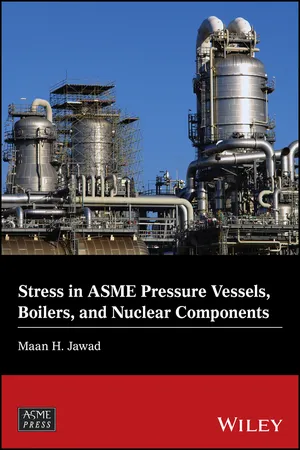
- English
- ePUB (mobile friendly)
- Available on iOS & Android
Stress in ASME Pressure Vessels, Boilers, and Nuclear Components
About this book
An illustrative guide to the analysis needed to achieve a safe design in ASME Pressure Vessels, Boilers, and Nuclear Components
Stress in ASME Pressure Vessels, Boilers, and Nuclear Components offers a revised and updatededition of the text, Design of Plate and Shell Structures. This important resource offers engineers and students a text that covers the complexities involved in stress loads and design of plates and shell components in compliance with pressure vessel, boiler, and nuclear standards. The author covers the basic theories and includes a wealth of illustrative examples for the design of components that address the internal and external loads as well as other loads such as wind and dead loads.
The text keeps the various derivations relatively simple and the resulting equations are revised to a level so that they can be applied directly to real-world design problems. The many examples clearly show the level of analysis needed to achieve a safe design based on a given required degree of accuracy. Written to be both authoritative and accessible, this important updated book:
- Offers an increased focus on mechanical engineering and contains more specific and practical code-related guidelines
- Includes problems and solutions for course and professional training use
- Examines the basic aspects of relevant theories and gives examples for the design of components
- Contains various derivations that are kept relatively simple so that they can be applied directly to design problems
Written for professional mechanical engineers and students, this text offers a resource to the theories and applications that are needed to achieve an understanding of stress loads and design of plates and shell components in compliance with pressure vessel, boiler, and nuclear standards.
Frequently asked questions
- Essential is ideal for learners and professionals who enjoy exploring a wide range of subjects. Access the Essential Library with 800,000+ trusted titles and best-sellers across business, personal growth, and the humanities. Includes unlimited reading time and Standard Read Aloud voice.
- Complete: Perfect for advanced learners and researchers needing full, unrestricted access. Unlock 1.4M+ books across hundreds of subjects, including academic and specialized titles. The Complete Plan also includes advanced features like Premium Read Aloud and Research Assistant.
Please note we cannot support devices running on iOS 13 and Android 7 or earlier. Learn more about using the app.
Information
1
Membrane Theory of Shells of Revolution
1.1 Introduction
1.2 Basic Equations of Equilibrium
Table of contents
- Cover
- Title Page
- Table of Contents
- Series Preface
- Acknowledgment
- 1 Membrane Theory of Shells of Revolution
- 2 Various Applications of the Membrane Theory
- 3 Analysis of Cylindrical Shells
- 4 Buckling of Cylindrical Shells
- 5 Stress in Shells of Revolution Due to Axisymmetric Loads
- 6 Buckling of Shells of Revolution
- 7 Bending of Rectangular Plates
- 8 Bending of Circular Plates
- 9 Approximate Analysis of Plates
- 10 Buckling of Plates
- 11 Finite Element Analysis
- Appendix A: Fourier Series
- Appendix B: Bessel Functions
- Appendix C: Conversion Factors
- References
- Answers to Selected Problems
- Index
- End User License Agreement